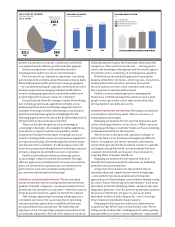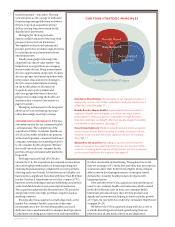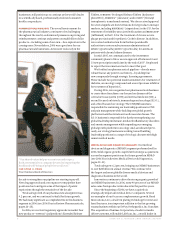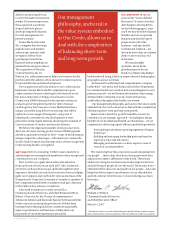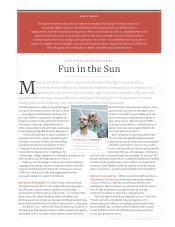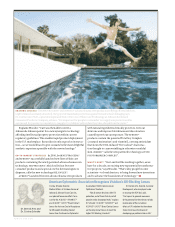Johnson and Johnson 2006 Annual Report Download - page 16
Download and view the complete annual report
Please find page 16 of the 2006 Johnson and Johnson annual report below. You can navigate through the pages in the report by either clicking on the pages listed below, or by using the keyword search tool below to find specific information within the annual report.
J O H N S O N & J O H N S O N 2 0 0 6 A N N U A L R E P O R T
A
breast cancer surgeon never faces a more frustrating mid-operative moment
than having to close a woman’s surgical wounds without knowing whether the
breast cancer cells have metastasized, or spread, to the patient’s lymph nodes.
The answer comes, all right—but
only days later, when a biopsy report
becomes available. And if the news is
bad, the doctor has to call the patient,
whose wounds are healing, and ask
her to come back for more—more
pre-op counseling, more sign-offs,
more anesthesia, more surgery, more
recovery, more pain, more scarring
and more anxiety.
Fortunately, this all-too-familiar
scenario need never occur again.
NO MORE WA I T I NG Now, a new
DNA-based diagnostic tool, the
GENESEARCH™ Breast Lymph Node
(BLN) Assay, can deliver test results
in 35 to 45 minutes, while the breast
cancer patient is still on the operating
table. No more false starts at healing.
No more waiting several days for news,
good or bad. No more second-surgery
heartaches.
The GENESEARCH™ assays use
molecular-level patented technology
to diagnose, stage and/or more accurately characterize disease,
far more quickly than ever before.
“With GENESEARCH™, we can quickly obtain a result on
the status of the sentinal lymph node,” says Dr. Jean-Marie
Nogaret, Chief Breast Surgeon, Institut Jules-Bordet, Brussels,
Belgium. “It is a benefit for the patient and for the medical
team, and it is more economical.”
PIONEERING DIAG N O S T I C S The new GENESEARCH™ diagnostic
test was pioneered by Veridex, LLC. The GENESEARCH™ BLN
test entered the European market in mid-2006 in compliance
with EU in vitro medical device regulations. It received a
favorable FDA advisory panel review in December 2006.
“The earlier a doctor can detect metastasized breast cancer
in a woman’s lymphatic tissue, the better the outcome—and
that’s where GENESEARCH™ comes in,” explains David Atkins,
Ph.D., the scientist who led the early
development of the GENESEARCH™
platform and now Vice President for
Europe, Middle East and Africa (EMEA)
for Ortho-Clinical Diagnostics, Inc.
(Ortho-Clinical). “In our new diagnostic
platform, the genetic detective is a
hunter of rogue DNA. It looks, at the
molecular level, for DNA that should
not be present, DNA that indicates the
spread of cancer.
“Detecting rogue DNA in lymph nodes
is essential to staging and treating the
disease with precision,” adds Atkins.
“Finding it, however, was thought to be
nearly impossible, due to the limitations
of underlying technology. But the
team working on this project thought
outside the box and developed a novel
approach to detecting the rogue DNA
intra-operatively.”
THE VA N G UARD OF A NEW ERA
Today, two out of every three medical
decisions are based upon in vitro diag-
nostic testing (conducted in a test tube or other controlled
environment)—a field in which Ortho-Clinical is a worldwide
leader. Says Roy Davis, Ortho-Clinical Company Group
Chairman: “As the focus shifts from lab operations to patient
outcomes, diagnostic tools like GENESEARCH™—and another
Veridex platform, CELLSEARCH™—will help write the next big
chapter in the history of medicine. They represent the vanguard
of a new era in which cellular- and molecular-based diagnostics
will enable doctors to manage more patients back to wellness
rather than just coping with illness.”
Ortho-Clinical is at the forefront of a major transformation
happening in diagnostics. The company’s approach is two-
pronged. As Veridex introduces new diagnostic platforms
in oncology, Ortho-Clinical’s franchise development group
is actively engaged in identifying new biological markers in
select categories of major unmet medical needs. Many of these
O U R P A S S I O N T R A N S F O R M S :
The Power of Knowing
14
Under the GENESEARCH™ brand, Veridex
develops products based on molecular
technology for gene expression profiling.
Gene arrays such as this one help physicians
detect the presence of cancer earlier.


